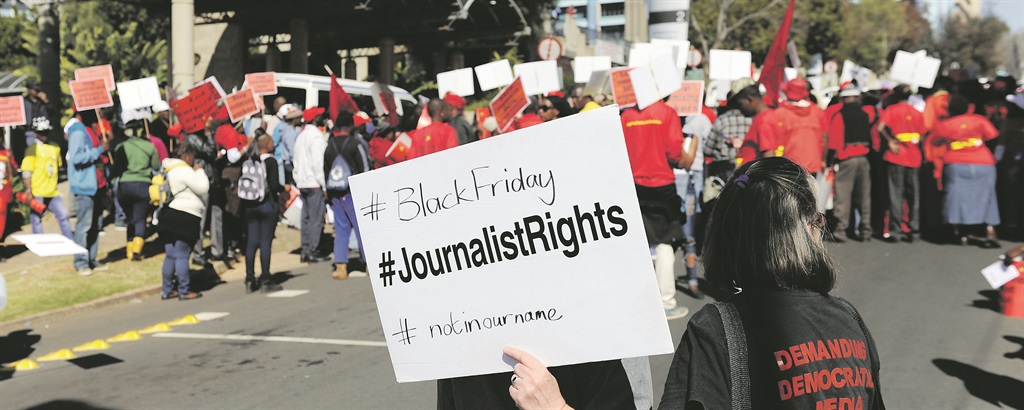
There is a disturbing trend regarding our local media making news headlines, even though this phenomenon is not limited to our shores.
The media in Colombia, Egypt and the UK also end up on the front page for all the wrong reasons.
In the UK, this is epitomised by billionaire Rupert Murdoch, the man who, with his family, owns 21st Century Fox and News Corp – and whose name has become synonymous with allegations of phone hacking, bribery and corruption.
In South Africa, our state broadcaster leads all media platforms in courting unwelcome headlines for its misdeeds.
In reams of print, the media comment on the media as the public eagerly air their views on radio, and social media platforms go viral on the subject.
Street poles – my first contact with the news when driving – are littered with posters about ongoing developments in the media.
And the SABC’s chief operating officer, Hlaudi Motsoeneng, is now as regular a newsmaker here as Murdoch has been overseas.
But Motsoeneng and the SABC are not alone. Local 24-hour news channel Africa News Network7 (ANN7) has also hogged the headlines.
First it was the subject of ridicule for on-air gaffes and technical hitches that accompanied its launch in 2013.
Then problems with staff surfaced as questions swirled about the Gupta family-owned channel’s independence from political interference.
The latest scandal involves ANN7’s firing on Tuesday of five journalists, who were protesting against the dismissal of eight of their colleagues in June, after the latter had refused to become embroiled in the channel’s political and financial battles.
Newspapers, too, have had their share of negative coverage.
Like ANN7, Gupta-owned newspaper The New Age was dogged by scandal even before the eve of its launch in 2010, following the resignation of editor Vuyo Mvoko and five senior staff members the day before the first edition’s publication.
The Citizen was lambasted by other media outlets when its first black editor, Steven Motale, broke ranks and apologised to President Jacob Zuma for the “unfair” criticism he once directed at him. He found allies in The New Age and ANN7.
Recently, the Sunday Times was criticised for its coverage of the SA Revenue Service rogue unit.
Editor Bongani Siqoko had to apologise for the story, which was published by his predecessor, Phylicia Oppelt, the newspaper’s first female editor.
In 2013, Oppelt became engaged in a public spat with the then editor in chief of City Press, Ferial Haffajee – also its first female editor – for calling City Press a “failing publication”.
Then there is Independent News & Media.
It has been in the spotlight since executive chair Dr Iqbal Survé fired Cape Times editor Alide Dasnois in 2013 for not featuring former president Nelson Mandela’s death in the paper, but instead doing a wraparound.
After Dasnois sued for unfair dismissal, an out-of-court settlement was reached.
But this week, the Press Ombudsman ordered the paper to issue a front-page apology to Dasnois for the manner in which it covered that settlement.
The Mail & Guardian has endured negative publicity over issues ranging from financial woes to misleading front-page stories – a recent one being about DA boss Mmusi Maimane having been mentored by former president FW de Klerk.
Things seemed squeaky clean at eNCA, the country’s first 24-hour news channel, until October 2014 – when John Copelyn, the chief executive of the channel’s holding company, got into a spat with his one-time ally and business partner, Marcel Golding.
And in June this year, eNCA made headlines when reporter Nontobeko Sibisi protested against the removal of footage she had compiled for an on-air screening – without her knowledge – because she was wearing a doek.
Soon after, journalist Phakamile Hlubi quit the channel, accusing it of racism and lack of transformation.
Amid this sorry media saga, one man stands out: Motsoeneng, who seems more powerful than Murdoch.
Under his tenure, SABC senior staff and board members have come and gone. The support he has amassed from artists and other interest groups is alarming.
As his reign courts ever more controversy, the SABC’s credibility is being soiled.
Despite having lied about his qualifications, he has survived a ruling against him by the Public Protector and defied the Independent Communications Authority of SA to live long and prosper at the SABC.
The sooner the chaos there is dealt with, the better. And as for the rest of our media, it is time they focus on news, not on being the news.
Sepotokele is a journalist-turned-communication strategist and media trainer. He writes in his personal capacity




 Publications
Publications
 Partners
Partners








